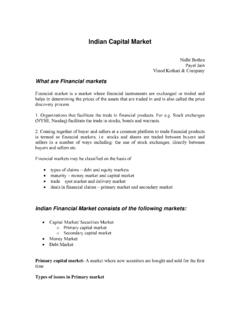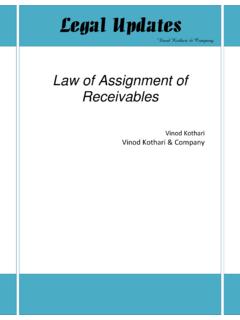Transcription of FAQs - Vinod Kothari Consultants
1 faqs on Overseas Direct Investment CS Esha Chakraborty Abhirup Ghosh Corporate Law Services Group Updated as of June 18, 2014 faqs Check at: for more write ups. Copyright: This write up is the property of Vinod Kothari & Company and no part of it can be copied, reproduced or distributed in any manner, except explicit permission from the Author. Disclaimer: This write up is intended to initiate academic debate on a pertinent question. It is not intended to be a professional advice and should not be relied upon for real life facts. faqs on Overseas Direct Investment faqs Contents 1. What are the governing regulations for making overseas investment? .. 4 2. What is Overseas Direct Investment? .. 4 3. Can an Indian Party or a resident Individual make investment in any activity? .. 4 4. How can an Indian Party make direct investment outside India? .. 5 5. What are the limits of ODI? .. 6 6. What should be reckoned under Total Financial Commitment by an Indian Party?
2 6 7. What are the various sources of funding ODI? .. 6 8. Can the net worth of subsidiary/holding company of the Indian party be utilized for investing in a JV/WOS abroad? .. 7 9. What are the various filing requirements in ODI? .. 8 10. Can Indian Parties invest through special purpose vehicles (SPV)? .. 8 11. Can Indian Parties set up step-down overseas subsidiaries under the Automatic route? ..8 12. Is ODI in Agricultural Operations permissible? .. 8 13. Can an Indian party make overseas investment in Financial Service Sector?.. 9 14. Can any Registered Trusts or Societies in India make ODI? .. 9 15. Is an Indian Party permitted to extend loan/guarantee on behalf of its overseas JV/WOS? .. 10 16. Is an Indian Party permitted to extend loan/guarantee on behalf of step down subsidiaries of its overseas JV/WOS? .. 10 17. Can resident individual promoters issue personal guarantee on behalf of the overseas JV/ WOS? .. 10 18. Is an Indian Party allowed to invest in any foreign security, without the limits?
3 10 19. Is an Indian Party allowed to undertake financial commitment, without equity contribution? .. 11 20. Are there any separate requirements for making investment by way of exchange for shares of a foreign company? .. 11 21. What all parameters does RBI consider while evaluating such applications? .. 12 22. How to make investments by way of capitalisation? .. 12 23. Can an Indian Party transfer its holding in an overseas JV/WOS? .. 12 24. Can the Indian Party transfer any holding in an overseas JV/WOS, involving write-offs?..13 25. Can an Indian Party create charge on its properties or financial assets in favour of overseas JV/WOS? .. 14 26. What are the obligations of an Indian party making ODI? .. 14 faqs on Overseas Direct Investment faqs 27. Can resident individuals, in any manner, invest in foreign entities? .. 14 28. How can resident Individuals make direct investments in overseas JVs and WOS? . 15 29. How are Compulsorily Convertible Preference Shares (CCPS) treated for the purpose of ODI?
4 15 30. Can investment be made in overseas JV/WOS by way of Share Swaps? .. 16 31. Can overseas investments be made by Domestic Venture Capital Funds (VCF)? .. 16 32. Can Indian Parties invest in foreign entities other than by way of direct investments? ..16 faqs on Overseas Direct Investment faqs The very concept of Overseas Direct Investments has been looked upon with a lot of curiosity and apprehension, at the same time! The governing body, Reserve Bank of India has also never failed to surprise us with the intricacies in its guidelines. While each case of such investment(s) has to be dealt separately based on its structure; with the following questions, we seek to understand the basic ground rules - 1. What are the governing regulations for making overseas investment? Direct investment outside India is governed by Foreign Exchange Management (Transfer or Issue of Any Foreign Security) (Amendment) Regulations, 2004 ( FEMA Regulations ), as amended from time to time.
5 2. What is Overseas Direct Investment? Overseas Direct Investments (ODI) refers to the investments made in the overseas entities by way of contribution to their capital or subscription to the Memorandum of Association of a foreign entity or by way of purchase of existing shares of a foreign entity either by market purchase or private placement or through stock exchange, but it does not include portfolio investment. 3. Can an Indian Party1 or a resident Individual make investment in any activity? Primarily, yes. But, subject to the Regulations and/or prior approval of the Reserve Bank of India (RBI) i. any person resident in India shall not make any direct investment outside India; and ii. an Indian party shall not make any direct investment in a foreign entity engaged in real estate or banking sector. 1 'Indian Party' means a company incorporated in India or a body created under an Act of Parliament or a partnership firm registered under the Indian Partnership Act, 1932 or a Limited Liability Partnership (LLP) under the Limited Liability Partnership Act, 2008 ( LLP inserted as per RBI Notification No.)
6 299/2014-RB dated March 25, 2014, yet to be gazetted) making investment in a Joint Venture or Wholly Owned Subsidiary abroad, and includes any other entity in India as may be notified by the Reserve Bank: - Provided that when more than one such company, body or entity make an investment in the foreign entity, all such companies or bodies or entities shall together constitute the 'Indian Party'. faqs on Overseas Direct Investment faqs Investments in Real estate sector would include buying and selling of real estate or trading in Transferable Development Rights (TDRs) but does not include development of townships, construction of residential/commercial premises, roads or bridges. 4. How can an Indian Party make direct investment outside India? An Indian Party can make direct investment in a Joint Venture2 or Wholly Owned Subsidiary3 outside India. The conditions for making such investment are as under: (i) The total financial commitment of the Indian Party in Joint Ventures / Wholly Owned Subsidiaries shall not exceed 100%, or as decided by the Reserve Bank from time to time, of the net worth of the Indian Party as on the date of the last audited balance sheet; (ii) The direct investment should be made in an overseas JV or WOS engaged in a bonafide business activity; (iii) The Indian Party should not be on the Reserve Bank s Exporters caution list /list of defaulters to the banking system circulated by the Reserve Bank or under investigation by any investigation /enforcement agency or regulatory body; (iv) The Indian Party must have submitted its Annual Performance Report in respect of all its overseas investments in the format given in Part III of the Form ODI.
7 (v) The Indian Party must route all transactions relating to the investment in a Joint Venture/Wholly Owned Subsidiary through only one branch of an authorised dealer4 to be designated by it. (vi) the Indian Party must submit Part I of the Form ODI, duly completed, to the designated branch of an authorised dealer 2 means a foreign entity formed, registered or incorporated in accordance with the laws and regulations of the host country in which the Indian party makes a direct investment 3 means a foreign entity formed, registered or incorporated in accordance with the laws and regulations of the host country, whose entire capital is held by the Indian party 4 The Indian Party may designate different branches of authorised dealers for different Joint Ventures/Wholly Owned Subsidiaries outside India. faqs on Overseas Direct Investment faqs 5. What are the limits of ODI?
8 The Total Financial Commitment by an Indian Party in its Joint Venture company (JV) /Wholly-owned subsidiary (WOS) outside India should not exceed 100% of net worth of the Indian Party. The net worth should be as per the last audited balance sheet of the Indian Party. 6. What should be reckoned under Total Financial Commitment by an Indian Party? For the purpose of determining Total Financial Commitment within the said limit of net worth, the following should be considered a. Remittance by market purchases, namely in freely convertible currencies; in case of Bhutan, investment made in freely convertible currencies or equivalent Indian Rupees, in case of Nepal, investment made only in Indian Rupees; b. Capitalization of export proceeds and other dues and entitlements; c. 100% of the value of guarantees issued by the Indian party to on or behalf of the overseas JV/WOS; d. Investment in agricultural operations through overseas offices or directly; e.
9 External Commercial Borrowing in conformity with other parameters of the ECB guidelines; f. 50% of the value of performance guarantee issued by the Indian party to or on behalf of the overseas JV/WOS. In cases where invocation of the performance guarantees breach the ceiling for the financial exposure of 100% of the net worth of the Indian party, the Indian party shall seek the prior approval of the Reserve Bank before remitting funds from India, on account of such invocation. g. 100% of the value of the bank guarantee(s) issued by a resident bank on behalf of an overseas JV/WOS of the Indian party, which is backed by a counter guarantee / collateral by the Indian party. 7. What are the various sources of funding ODI? Indian Parties may invest out of one or more of the following sources i. Out of balance held in the Exchange Earners Foreign Currency account of the Indian Party maintained with the Authorised Dealer. Provided that the ceiling of 100% of net worth shall not apply where the investment is made out of balances held in its EEFC account, maintained in accordance with the aforesaid regulations.
10 faqs on Overseas Direct Investment faqs ii. Drawal of foreign exchange from an authorised dealer in India which shall not exceed 100% of the net worth of the Indian Party as on the date of last audited balance sheet. For the purpose of 100% of the net worth as per the last audited balance sheet of the India, the following shall be reckoned: (a) cash remittance by market purchase (b) capitalisation of export proceeds and other dues and entitlements; (c) 100% of the amount of guarantees issued by the Indian party to or on behalf of the overseas JV/WOS; (d) utilisation of the amount raised by issue of ADRs/GDRs by the Indian party; (e) External Commercial Borrowing in conformity with other parameters of the ECB guidelines; (f) Swap of shares; (g) ADR/GDR Stock Swap subject to the valuation norms and sectoral cap; (h) 50% of the value of performance guarantee issued by Indian party to or on behalf of the overseas JV/WOS; (i) 100% of the value of the bank guarantees issued by a resident bank on behalf of an overseas JV/WOS of the Indian party, which is backed by a counter guarantee/collateral by the Indian party.






